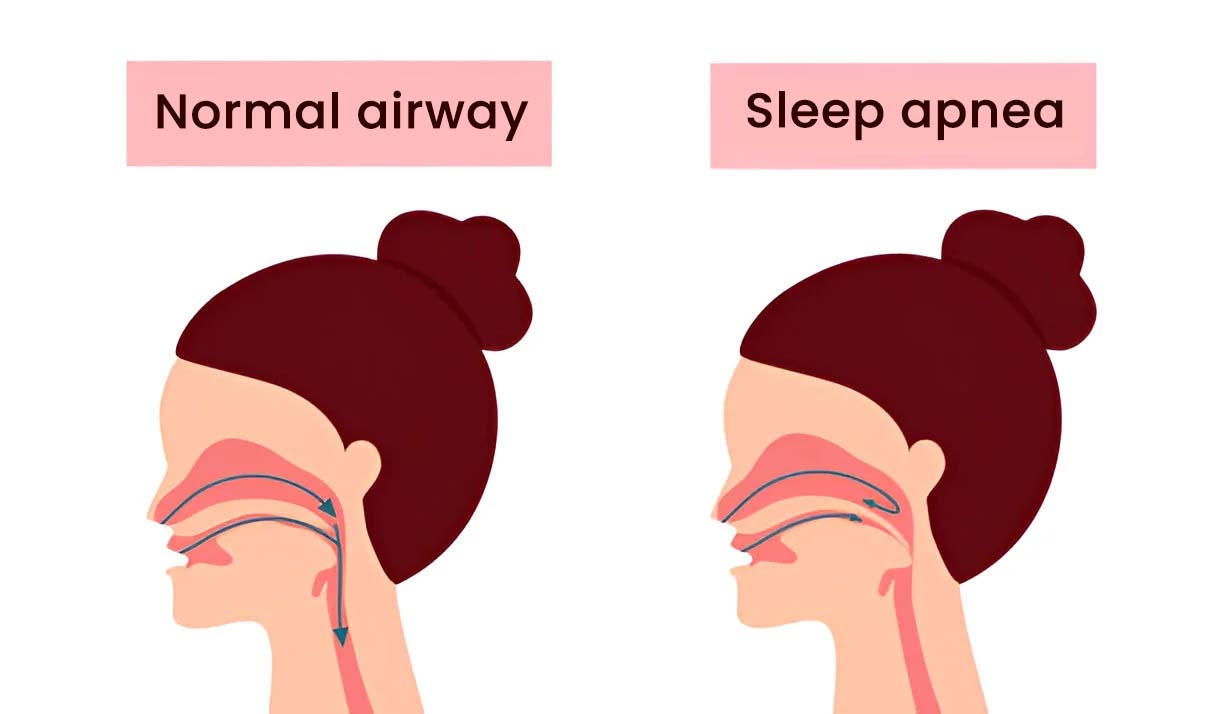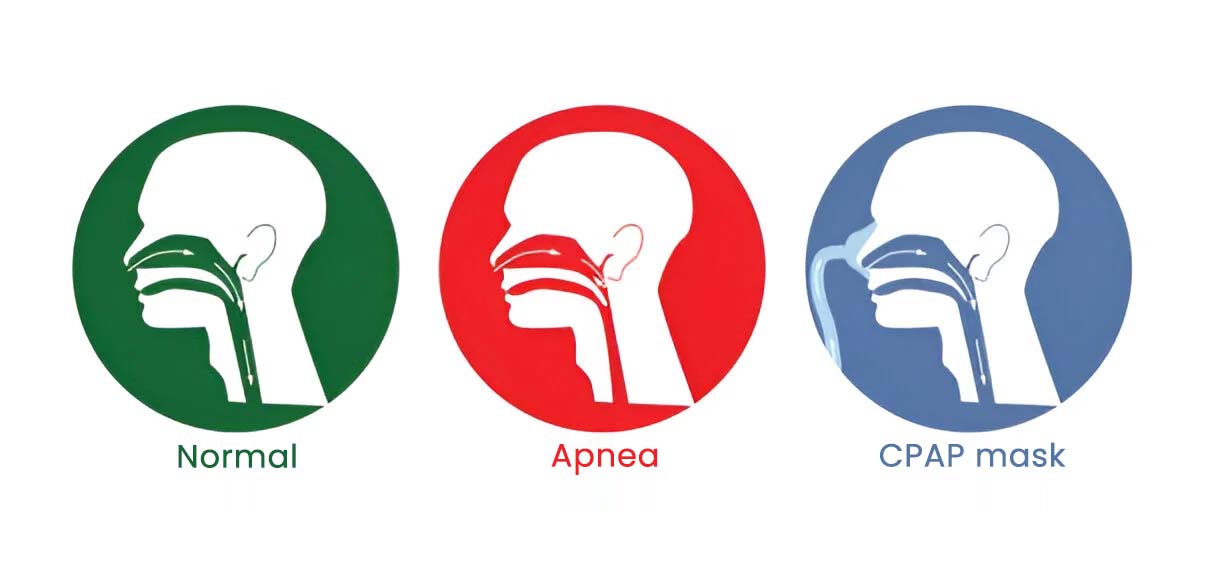Is anything more irritating than having a snorer lying beside you in bed? Maybe not. These bizarre noises hurt the affected person and the other people around them. Although we continue to ignore it, this issue is far more than just a noise. Regular snoring may also indicate other health issues, such as obstructive sleep apnea.
Although snoring is prevalent, many people wish they could stop it. So, if you don't want to accept your fate as a lifelong snorer, you should stay until the end. We are here to investigate the causes of snoring and show how a good pillow can reduce it.
What Triggers Snoring?
Before proceeding, we should establish the causes of snoring. Why do we snore, what are its consequences, and can we control it?
Snoring is caused by the rattling and vibration of tissues near the airway in the back of the throat. During sleep, the muscles loosen, leaving a very narrow passage for the air to pass. As you inhale and exhale, the moving air causes the tissue to flutter and make those annoying noises.
Some people might be affected by it, while others might not. This is because the size and shape of the muscles and tissues might vary from person to person. There are always exceptions. You may not every time you sleep, but certain risky factors can make you a frequent snorer. You might want to turn your concern towards these:
- Consumption of Alcohol
- Pregnancy
- Consumption of sedatives
- Nasal Congestion
- Obesity
- Small jaw
- Nasal Polyps (deviated septum)
- Large tonsils or tongue

Snoring vs. Sleep Apnea
Obstructive sleep apnea (OSA) is a breathing disorder in which the airway gets blocked or collapses during sleep, causing repeated lapses in breath. Snoring tends to be loud and sound as if a person is choking, snorting, or gasping. Look out for these signs if you suspect anything unusual:
- Breathing heavily while you're asleep
- Abruptly awakening from sleep and struggling for air
- Insomnia
- Excessive perspiration while you sleep
- Morning headaches or mouth dryness
- Excessive daytime sleepiness, irritability
- Forgetfulness or attentional issues
- Impotence
Does Snoring Always Lead to Sleep Apnea?
Not all snorers have apnea, but the two often go hand in hand. As these sounds get louder, the chances of having sleep apnea increase. If you have apnea, your bed partner might notice that pauses in breathing punctuate the snores. Those are apnea episodes, and they can recur hundreds of times a night.
You must seek treatment if experiencing any sleep apnea symptoms described above. Undiagnosed and untreated sleep apnea is directly tied to an increased risk in your cardiovascular and metabolic health.
Best Pillows for Snoring
Now that we have explored every cause, let’s move on to the most exciting part: How can a pillow help reduce snoring? By answering this question, we are not claiming that buying the right pillow will cure snoring or sleep apnea.
We must be mindful that picking the right pillow will only help you sleep right, maintain proper body posture in bed, and provide sufficient support. All these factors contribute to avoiding the possibility of snoring. So, trying some home care is reasonable, and your pillow is an excellent place to start.
A supportive pillow can help you sleep on your side, and a proper position will reduce or even end your snoring issues. You can go for any of the following pillows if you are a loud snorer:

Body Pillow
You must have heard of the ancient technique of sewing a tennis ball onto the back of your pajamas or nightwear. This was done to keep you from turning over onto your back. A body pillow is a bolster-shaped cushion, a modern solution for the exact purpose. You can place it against your spine, and it will help you sleep on your side all night.
Anti-Snore Pillow
Anti-snoring pillows are made to minimize snoring by aligning your head and shoulders. This will keep your airways open and allow you to breathe comfortably through the night. These also help you sleep on your side, which is always good, as snoring is most triggered when you sleep on your back.
Many anti-snoring pillows are made with polyurethane. They’re firm enough to keep you in position and provide neck support for comfort. These pillows are available in many sizes and shapes, such as rectangles, ovals, triangles, and more. They are usually more profound in the middle and higher on the ends to give firm support while side sleeping.
Side Sleepers Pillow
The name says it all! Side sleeping pillows are specifically made for side sleepers, so these would be perfect if you are a big-time snorer and need to sleep on your side. Side sleeper pillows are available in many shapes and sizes, but the contour shape will benefit you the most.
Eli & Elm side sleeper pillows are designed with a unique contour shape to keep your posture appropriately aligned while you sleep. These pillows have multiple health benefits, as they not only reduce snoring but are also effective in relieving back problems.
Wedge Pillow
By now, we have established that sleeping alone is quite helpful in reducing snoring. But what if you can’t sleep on your side? Sometimes, habits are just too difficult to change or develop. That’s where wedge pillows come in handy. Even if you sleep on your back, you can elevate your head.
This doesn’t mean the easy way out, which is stuffing pillows under your head. That would be worse for your head, neck, and shoulder. A wedge-shaped pillow, often made of memory foam, works because it supports your shoulders and back.
Call Your Doctor
Not all pillows will be comfortable for everyone. Give it a try for a few evenings. Before purchasing any pillows, find out if you can return them if they don't help you. It can end up being a costly experiment. But sometimes, buying a pillow may not cut it for you. If you are experiencing constant unusual symptoms, it’s a good idea to check with your doctor to confirm whether it is an issue that needs immediate medical attention.
Sources:
Advanced Dental Sleep Treatment Centre: Can a Pillow Treat Your Snoring?
Sleep Foundation: Snoring: The Causes, Dangers, & Treatment Options
Baptist Health: Difference Between Snoring And Sleep Apnea






















